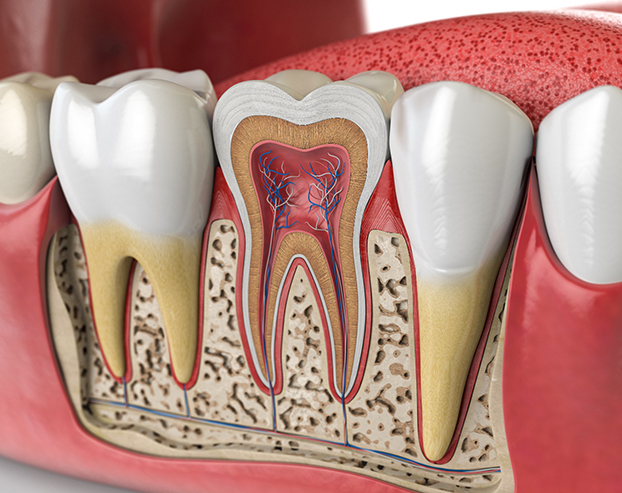Root Canal Therapy – Boston, MA
How We Make Toothaches Disappear
If you have a severely decayed or infected tooth, you don’t have to get it extracted! Instead, we can save it with root canal therapy in Downtown Boston. Although it has a bad reputation for being painful, this procedure is actually no worse than getting a small filling. At Devonshire Dental of Boston, we embrace the latest innovations in dentistry to stop your pain and prevent your tooth from needing to be removed with root canal therapy in Boston, MA.

Why Choose Devonshire Dental of Boston for Root Canal Therapy?
- Care Provided by In-House Endodontist (Root Canal Expert)
-
Your Comfort Is Our
Top Priority -
Conveniently Located in the
Financial District
Why Do I Need a Root Canal?

A root canal is an endodontic procedure used to restore the health of a tooth that has been compromised from leaving a cavity untreated. Your teeth are made of different layers, each of which is necessary to keep them strong and healthy. The outer layer, which is visible when you smile, is your enamel. It acts as a protective barrier for the dentin that lies underneath it. The dentin contains small tubules that connect to the inner layer of your tooth, called the pulp. This is the nerve center of your tooth and contains living tissue.
When a cavity forms, it starts in your enamel. As it is attacked by bacteria and acid, it causes a small hole to form. At this point, it can be treated easily with a simple dental filling. If it is not, the decay will eventually extend to the dentin. After it has reached the dentin, it can spread to the pulp, causing an infection. This can lead to serious pain and losing your tooth if it is not treated. To stop the complications, the pulp is extracted using a root canal. Although it is necessary while your tooth is still forming, it can survive without the pulp.
What Can I Expect During the Root Canal Procedure?

After an initial consultation with your Downton Boston dentist, a customized treatment plan is created. A local anesthetic is used to reduce your discomfort. The areas of damage are removed using special dental tools. By opening the crown, the pulp is extracted, and your tooth is sterilized. It is then sealed using a material called gutta-percha. Now that the health of your tooth is reinstated, it is time to improve its structure and appearance. To do this, a dental crown is needed, which is a custom-made cap that is placed over your tooth.
Digital impressions of your tooth are taken to design your restoration. It will be made to match your exact size, color, and shape needs in a dental lab. To ensure precision, this can take a couple of weeks. In the meantime, we will attach a temporary crown until your permanent one is ready. After your procedure, it is normal to experience some slight pain and tenderness for a day or two, but it will subside quickly. While you recover and until you receive your permanent crown, it is best to avoid chewing with your tooth.
Save Your Tooth Today!

If you have a damaged tooth, do not have it removed. Instead, save it with a root canal. Contact our dental office today to schedule your consultation.
Understanding the Cost of Root Canals

When you’re preparing to have root canal treatment performed, you’ll want to make sure that the procedure fits into your budget. Our team will explain what the cost of your root canal treatment will look like based on the specifics of your case. On top of that, if you are planning on using your dental insurance to help pay for the treatment, we can review your plan, answer any questions you might have, and work with you to maximize your benefits.
Factors That Can Affect Root Canal Cost

Why don’t all root canal treatments cost the same? There are quite a few reasons. For one thing, some teeth are more complicated to treat than others. For example, the molars (the teeth near the back of your mouth primarily used for chewing) have more roots compared to the front teeth. Consequently, root canals involving the molars are typically more complex and therefore more expensive.
On top of that, the root canal treatment itself may not be the only service that you have to pay for. In particular, you will likely need to get a crown after the procedure in order to strengthen the tooth and keep it safe from further harm. The crown will carry its own separate cost that you will have to make room in your budget for.
If you want more information about the factors that can influence the cost of your root canal treatment, don’t hesitate to speak to our team members during your initial consultation.
Is it Cheaper to Pull My Tooth?

People who are worried about the cost of root canal treatment sometimes consider pursuing a tooth extraction instead. But while tooth extractions may cost less, root canal treatments can ultimately be the financially smarter option. By keeping the tooth, you can avoid the oral health consequences that often accompany an incomplete smile, and you won’t have to pay for dental implants or another type of tooth replacement.
Does Dental Insurance Cover Root Canal Treatment?

When having any sort of major dental procedure performed, your first instinct is likely to be to use your dental insurance to reduce the amount that needs to be paid out of your own pocket. Many dental insurance plans will provide partial coverage for a root canal treatment. Said coverage could be between 50% and 80%; it depends on whether your insurance company considers the treatment in question to be a major procedure or a minor one.
When it comes to dental insurance, we try to make things as easy as possible for our patients. We are in-network with Delta Dental and Blue Cross Blue Shield, and we can also file claims for other plans as well. To find out whether we take your insurance, simply call our office and speak to one of our helpful team members.
Root Canal FAQs

On this page, we’ve covered why root canal treatment is necessary as well as what to expect during the procedure. If you want to continue your research on this tooth-saving restorative dental treatment, then you’ll be happy to know that you’re in the right place! If you have a specific question and would like a specific answer from our team, then you’re always welcome to call us. Otherwise, you can read on for the answers to FAQs about root canal treatment.
How Much Pain is Normal After a Root Canal?
Immediately following your root canal treatment, you probably won’t feel anything since the numbing agent typically takes a few hours to wear off. After that, however, some soreness is normal. To help keep you comfortable, our Boston dental team will provide you with detailed aftercare instructions, including rinsing with warm saltwater periodically and taking OTC pain medication.
Important note: If your pain doesn’t subside around the three-day mark or seems to be getting worse with each passing day, then you should call us ASAP so we can conduct an exam.
What Should I Do Before a Root Canal?
Leading up to your appointment, it’s a good idea to touch base with your dental team. After all, the preparation process looks a bit different for each patient. For example, if oral conscious sedation is a part of your treatment plan, then you’ll need to pick up the medication and arrange for a trusted adult to drive you to and from your appointment. Of course, there are a few things that we recommend for patients across the board, like getting a good night’s sleep and wearing something comfortable to your appointment.
Can Root Canals Be Prevented?
Generally speaking, the answer is “yes!” To help protect your teeth from harm, we encourage our patients to avoid unhealthy dental habits, like chewing on ice cubes, smoking, or biting their nails. Additionally, you should implement a solid oral hygiene regimen, visit us twice a year for a checkup and cleaning, and wear a mouthguard when playing sports. Together, best practices like these will help you keep your teeth and gums healthy for life!
Why Do I Need a Root Canal if My Tooth Doesn’t Hurt?
Although pain is a common warning sign that root canal treatment is needed, it isn’t the only one. A pimple-like bump on your gums, dark discoloration on one or more of your teeth, and red, inflamed, or swollen gums are all symptoms of a severely decayed or infected tooth. So, even if your tooth doesn’t hurt, you may still need this restorative dental service to restore your oral health. As always, if you have any questions about the treatments we recommend, don’t hesitate to ask! We can review our findings with you, answer any questions you have, and help you better understand how we came to that conclusion.